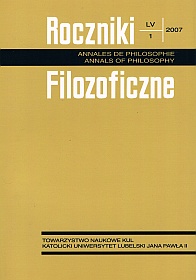Doświadczenie mistyczne w ujęciu konstruktywistycznego kontekstualizmu Stevena T. Katza
Abstrakt
The aim of this article is to present an interpretative model of mystical experience, which emerges from the publications of S. Katz, professor of philosophy of religion and comparative mysticism at Boston University (USA). His view originated as a negative reaction to the conception known in the contemporary philosophical reflection on mysticism as “universal core” that promotes a conviction about the possibility of reduction of variety of mystical experiences basically to one common model. S. Katz’s point of view is pluralistic; it means he realizes impassable differences among different kinds of mysticisms. His theory is based on a notion of experience conceived as mediated. As a consequence of this assumption he presents mystical experience as a shaping process, in which decisive factors are the constructive abilities of human mind, the cultural milieu and religious traditions, where the experience takes place, and finally the experienced reality thought as conditioned contextually and subjective. The paper besides the presentational goals brings also an attempt of critical evaluation of the presented views.
Bibliografia
Apczynski J. V.: Mysticism and Epistemology, „Studies in Religion / Sciences Religieuses” 2 (1985), s. 193-205.
Baumann P., Lekka-Kowalik A.: Kontekstualizm, [w:] Powszechna Encyklopedia Filozofii, t. V, Lublin 2004, s. 825-829.
Brower B. W.: Contextualism, Epistemological, [w:] Routledge Encyclopedia of Philosophy, t. II, London and New York 1998, s. 646-650.
Downes S. M.: Constructivism, [w:] Routledge Encyclopedia of Philosophy, t. II, London and New York 1998, s. 624-630.
Evans D.: Can Philosophers Limit what Mystics Can Do? A Critique of Steven Katz, „Religious Studies” 1 (1989), s. 53-60.
Forgie W. J.: Hyper-Kantianism in Recent Discussions of Mystical Experience, „Religious Studies” 21 (1985), s. 205-218.
Forman R. K. C.: The Construction of Mystical Experience, „Faith and Philosophy” 5 (1988), s. 254-267.
Forman R. K. C.: Paramartha and Modern Constructivist on Mysticism: Epistemological Monomorphism versus Duomorphism, „Philosophy East and West” 4 (1989), s. 393-418.
Forman R. K. C.: (red.): The Problem of Pure Consciousness. Mysticism and Philosophy, New York: Oxford University Press 1990.
Gill J. H.: Mysticism and Meditation, „Faith and Philosophy” 1 (1984), s. 111-121.
Hajduk Z.: Konstruktywizm, [w:] Powszechna Encyklopedia Filozofii, t. V, Lublin 2004, s. 814-816.
Janz B.: Mysticism and Understanding: Steven Katz and His Critics, „Studies in Religion / Sciences Religieuses” 24 (1995), s. 77-94.
King S. B.: Two Epistemological Models for the Interpretation of Mysticism, „Journal of the American Academy of Religion” 61 (1988), s. 257-279.
Smith H.: Is There a Perennial Philosophy?, „Journal of the American Academy of Religion” 55 (1987), s. 553-566.
Stoeber M.: Constructivist Epistemologies of Mysticism: A Critique and a Revision [shortcomings of J. Hick’s exposition], „Religious Studies” 28 (1992), s. 107-116.
Copyright (c) 2007 Roczniki Filozoficzne

Utwór dostępny jest na licencji Creative Commons Uznanie autorstwa – Użycie niekomercyjne – Bez utworów zależnych 4.0 Międzynarodowe.





